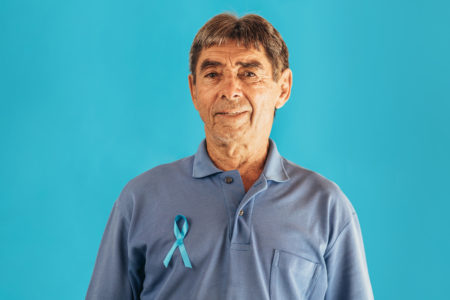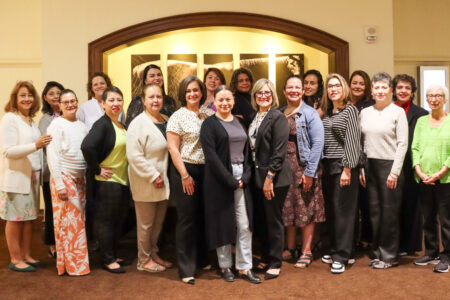
Share On Social!
Prostate cancer has a big impact on the Latino community.
One reason is that Latinos face a lack of easy-to-understand, culturally competent information — which leads to poor outcomes for those experiencing prostate cancer, according to a recent study published in BMC Public Health.
“Black and Latino focus groups revealed the existence of cultural beliefs, misunderstandings and fears pertaining to [prostate cancer] which could influence health-related behaviors,” according to the researchers from the University of Pennsylvania and MD Anderson Cancer Center.
“Some themes were common across groups; others suggested racial and gender predilections. Future targeted efforts focused on directly addressing prevalent misperceptions among underserved communities in urban settings could help to improve health literacy and equity in PC outcomes in these populations.”
What Is Prostate Cancer and Why Does it Matter to Latinos?
According to the Mayo Clinic, Prostate cancer is cancer that occurs in the prostate. The prostate is a small walnut-shaped gland in males that produces the seminal fluid that nourishes and transports sperm.
Prostate cancer is one of the most common types of cancer. Many prostate cancers grow slowly and are confined to the prostate gland, where they may not cause serious harm. However, while some types of prostate cancer grow slowly and may need minimal or even no treatment, other types are aggressive and can spread quickly.
 According to Cancer Facts & Figures for Hispanics/Latinos 2018-2020, prostate cancer is the most commonly diagnosed cancer among Hispanic men, with about 13,900 new cases expected in 2018.
According to Cancer Facts & Figures for Hispanics/Latinos 2018-2020, prostate cancer is the most commonly diagnosed cancer among Hispanic men, with about 13,900 new cases expected in 2018.
Among the major racial/ethnic groups in the United States, Hispanic men have intermediate prostate cancer incidence rates that are slightly lower than those in non-Hispanic whites.
About 83% of prostate cancer cases in Hispanics versus 87% of those in in non-Hispanic whites are diagnosed at a localized or regional stage (Figure 5, page 10), for which 5-year cause-specific survival is similar in both groups (98% for localized and 96% regional stage). Five-year cause-specific survival for distant-stage disease declines to 35% among Hispanics and 30% among non-Hispanic whites.
The New Study on Prostate Cancer and its Findings
The recent University of Pennsylvania-led study, “Stigma, beliefs and perceptions regarding prostate cancer among Black and Latino men and women,” outlines the ways in which misunderstandings about health concerns can lead to overall harm.
Its reasons like these that the researchers behind the study began studying this topic.
“Health disparities in [prostate cancer] are thought to reflect the complex interplay of socioeconomics, environment and biology,” they write.
“The potential impact of beliefs and perceptions about PC among Black and Latino populations on clinical disparities are not well understood. This qualitative study was conducted to assess current prevalent and pervasive stigma, beliefs and perceptions regarding [prostate cancer] among Blacks and Latinos living in a large metropolitan area, thereby identifying potentially modifiable barriers to care.”
Dominant themes that emerged with respect to prostate cancer diagnosis. These included the stigma surrounding this condition and the perceived role of an “unhealthy lifestyle” and certain sexual behaviors as risk factors for cancer development.
Mainly, researchers found that some major misconceptions, including the role of an “unhealthy lifestyle” and certain sexual behaviors as risk factors for prostate cancer development.

Still, there were other significant contributors among the different groups.
“Men expressed substantial confusion about [prostate cancer] screening guidelines,” the researchers write. “In the Black female group, the role of faith and religion in the course of the disease was a major theme. Both Black and Latina females discussed the role of fear and avoidance around [prostate cancer] screening and treatment, as well as the prevalence of misinformation about PC in their familial and social communities.”
Luckily, there are ways to catch cancers before they become life-threatening, including prostate cancer screening.
The American Cancer Society (ACS) recommends that men make an informed decision with their doctor about whether to be screened for prostate cancer at these stages:
- Age 50 for men who are at average risk of prostate cancer and are expected to live at least 10 more years.
- Age 45 for men at high risk of developing prostate cancer. This includes African Americans and men who have a first-degree relative (father or brother) diagnosed with prostate cancer at an early age (younger than age 65).
- Age 40 for men at even higher risk (those with more than one first-degree relative who had prostate cancer at an early age).
“After this discussion, men who want to be screened should get the prostate-specific antigen (PSA) blood test. The digital rectal exam (DRE) may also be done as a part of screening,” according to ACS. “If, after this discussion, a man is unable to decide if testing is right for him, the screening decision can be made by the health care provider, who should take into account the man’s general health preferences and values.
Other Cancer Disparities Among Latinos
Unfortunately, prostate cancer isn’t the only cancer causing serious harm.
Other cancers impacting Latinos include:

- Breast cancer is the leading cause of deathin Latinas. While breast cancer death rates have declined in recent years, the rate of decline among Latinas is lower (1.1% per year) than their white peers (1.8% per year).
- Latinas are 40% more likely to be diagnosed with cervical cancer, and 20% more likely to die from cervical cancer, compared to their white peers, the U.S. Department of Health and Human Services’ Office of Minority Health states
- There is a statistically significant disparity in stage-specific mortality of colon cancer by race, with a higher proportion of deaths from metastatic disease among Latinos than whites (48% vs. 44% respectively), a study published in Oncotarget states.
What You Can Do
It is clear to see that more work needs to be done.
“While the majority of participants acknowledged the importance of PC screening and early detection, discussion centered around the barriers to both the interest in seeking medical care and the likelihood of securing it,” the researchers write.
Fortunately, new methods like texting are emerging to promote cancer screening.
We also need more diversity in the cancer research and healthcare workforce, as well as diversity in cancer clinical trials.
To engage more Latinos in research, Dr. Amelie Ramirez’s Salud America! program at UT Health San Antonio is creating Latino-focused recruitment strategies and systems for cancer and Alzheimer’s clinical trials, supported by a grant from Genentech, a member of the Roche Group.
“Our new project will allow us to use culturally relevant digital health communications, advocacy networks, and clinical partnerships to promote health equity and advance clinical trials for cancer treatment and Alzheimer’s disease among Latinos,” she said.
Another way we can advocate for health equity is by downloading a Health Equity Report Card.
The Health Equity Report Card by Salud America! at UT Health San Antonio lets you see many local children are living in poverty and food deserts, what access to education and healthcare your neighbors have, and how many households get access to SNAP food benefits.
Then you can email your Health Equity Report Card to community leaders, share it on social media, and use it to make the case to address inequities where help is needed most!
GET YOUR HEALTH EQUITY REPORT CARD!
Explore More:
Latino CancerBy The Numbers
142
Percent
Expected rise in Latino cancer cases in coming years



